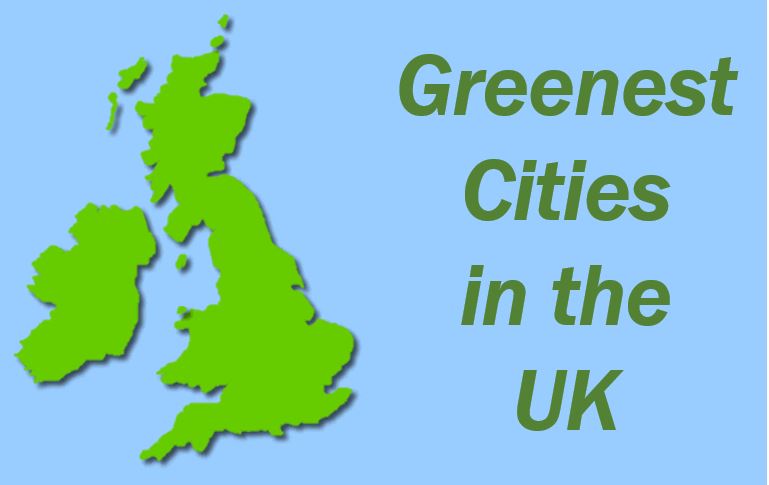We all want to live in an environmentally friendly city. No one wants waste piling up, attracting vermin and creating unnecessary health risks. Whether you want to move to a better place to live or get inspired to get your town to improve their practices, here are the places leading the way forward to an eco-friendly future.
 Although all of the top 10 cities are outside the South East of the country at present, there are opportunities ahead for every town and city to become the Greenest places in the world.
Although all of the top 10 cities are outside the South East of the country at present, there are opportunities ahead for every town and city to become the Greenest places in the world.
Eco-Friendly Scotland Leads the UK with Three of the Top Greenest Cities in the UK
Scotland has embraced moving towards an energy-efficient, clean waste future. As part of this, they have instituted the means to reduce pollution, improve air quality as well as creating more green space. This is underpinned by their recycling policies and reducing reliance upon single-use plastics. It is no surprise that with their robust policies and community activism that Edinburgh, closely followed by Aberdeen and Glasgow lead the way for the whole of the UK to follow.
Protecting its many natural places of beauty and biodiversity has taken centre stage in light of the climate crises, focused on protecting its unique species, habitats and landscapes. Nature conservation, including the marine environment, waste and pollution monitoring and impacts from the rest of the world led to the Scottish Government declaring its own climate emergency in 2019.
Although there are many challenges ahead, there is a will to double their annual rate of energy efficiency improvements to achieve their accelerated transformation as part of the Climate Change (Emission Reductions Targets) (Scotland) Act 2019.
Leading the way, Edinburgh already generates less waste per resident through active climate awareness which has changed behaviours including increased waste recycling, using public transport and reducing CO2 emissions even though its population has grown over 13% in the last decade, and it is one of the UK top tourist destinations.
England’s Top Seven Greenest Cities
Filling out the Top 10 list are seven cities in the West Midlands, the North East and Yorkshire. York, Oxford, Bristol, Newcastle, Leeds, Sheffield, and Birmingham have put environmental issues on the agenda, targeting recycling and effective waste removal, reducing the use of single-use plastics and fast-fashion consumption as well as reducing pollution rates.
There have been hundreds of initiatives across the UK to become more environmentally friendly. It is no surprise that many of the cities that made the top 10 list also have active University student bodies who champion the use of sustainability, and eco-friendly tech solutions.
From sustainable travel to upcycling to reuse virtually everything, many have turned to online forums to find, to learn, and to promote new ideas on how to create their own permaculture groups to create sustainable landscapes for wildlife, using whatever resources are at hand as well as targeting recycling from other parts of the country.
Making the Most of Recycling Throughout the UK
In larger cities like London, local waste removal experts are providing an efficient and effective mechanism to help householders and businesses ensure that their rubbish is dealt with properly. This, in turn, will help the whole of the UK hit their recycling targets, reduce the cost of disposing of waste and reduce CO2 emissions for waste which goes to landfills or is burned. Working towards 100% recovery from waste is the responsibility of everyone, including businesses, households and public authorities.
Already, community outreach and council focus on recycling, reuse and composting awareness have grown over the last decade. The charging for single-use plastic bags in Scotland and Wales which was extended to England in 2019 is a good step forward. Many retailers and food outlets were already prepared for the challenge as over 60% already had legislation restricting plastic bag use.
The Government also put a ban on plastic straws, stirrers and plastic-tipped cotton buds from April 2020, coming in the top 20% of countries to do so. It is hoped that they will match the EU wide ban of ten sign-use plastic items going into effect in 2021.
Eliminating the development of waste is crucial going forward, and although we need to reduce the bulk of waste products, it is also important to target the types of waste which are most harmful, namely those products which break down into microplastics.
The UK leads the world with legislation banning the use of microbeads in personal care products and cosmetics, which reduces the necessity for treatment plants to prevent them from entering our own water supplies.
The Way Forward
Removing the unnecessary use of plastic when there are better, natural alternatives at hand is essential throughout the UK. This goes hand in hand with ensuring that all waste is recycled properly or destroyed to prevent contamination.
With the second-year review of the Government’s 25 Year Environment Plan due this spring, many will look for progress protecting precious wildlife habitats and improving air quality. They will also be looking for the commitment needed to increase recycling and the removal and destruction of waste are carried out properly.
______________________________________________
Interesting related article: “What is Renewable Energy?“

